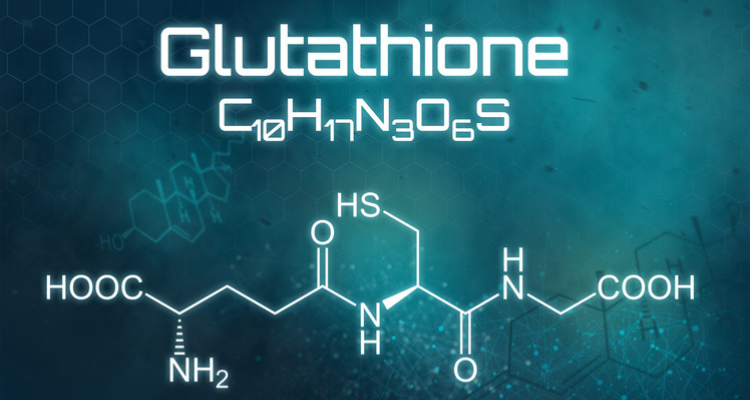No matter what your age, keeping your brain healthy is important to accomplishing tasks and goals. In school and work, a healthy brain keeps you focused and allows you to be productive and get a lot done. It’s the key to getting an A on tests or earning praise from your boss. It helps you juggle multiple tasks effectively. As you age, staying mentally sharp is essential to keeping your independence. It also stops you from misplacing your cell phones or car keys.
Whether you are a clinician trying to help curb brain fog for your patients, or if you are a consumer who wants better memory, increasing glutathione is just the ticket.* Glutathione may be one of the best antioxidant supplements for keeping the brain healthy, helping to think clearly, and even promoting attention and focus.* However, to get the full benefits of glutathione for the brain, you will need to choose a highly bioavailable glutathione supplement.*
Why the Brain Stops Working As Well
One of the main culprits behind normal cognitive decline is a damaging process known as oxidative stress or oxidative damage. It is one of the main reasons we lose brain cells as we age.1 Researchers agree that oxidative stress is a major reason the brain stops working well as we grow older.2
Oxidative stress is caused by free radicals, molecules that have a “rogue” or unpaired electron. These unstable molecules are reactive and can damage other molecules, tissues, and cells.
Some free radicals are normal. Mitochondria, the powerhouses of our cells, make a lot of free radicals as a byproduct of their normal activity: creating energy. When the body’s antioxidant systems (including glutathione) keep them in check, everything is fine.* However, when free radicals build up and overwhelm the antioxidant systems, we have oxidative stress.
The brain is an oxygen factory. The brain accounts for only about 2% of body weight, but it consumes 20% of your daily oxygen!3 Unfortunately, neurons in the brain are especially vulnerable to oxidative stress. Because of the brain’s need for oxygen, keeping oxidative stress at bay is an uphill battle. In addition, the brain is susceptible to oxidative stress because it’s high in fat, which can oxidize or “go rancid.” The brain is also high in iron and zinc, which can further fuel oxidative stress.
Support Memory and Shake Off Brain Fog with Glutathione*
Known as “the master antioxidant,” glutathione helps protect nearly every cell in the body against oxidative stress.* It also helps boost levels of other antioxidants like vitamins C and E.* In fact, glutathione is the brain’s major antioxidant.*
Cells need glutathione and other antioxidants to help neutralize free radicals and make them harmless.* If your glutathione levels aren’t high enough to counteract oxidative stress, your brain health and cognitive function may suffer.4*
Optimal glutathione levels support a healthy inflammatory response in neurons,5 by counteracting oxidative stress.* These brain cells are important for healthy brain aging and to help you think straight at any age.* They play an important role in fending off normal age-related absentmindedness.4*
Glutathione Deficiency May Harm Brain Health*
Your body makes glutathione naturally as a defense against free radicals, day in and day out. It comes from food and supplements. However, levels drop when oxidative stress shoots up, such as during aging, or when you are exposed to toxins, illness, or injury. Unfortunately, scientists have found that it’s very difficult for the brain to make enough glutathione to defend itself against the constant stream of oxidative stress.6
It’s a vicious cycle, unfortunately. Increased oxidative stress depletes glutathione levels and the decrease in glutathione then leads to more oxidative stress. This increase in oxidative stress, combined with low glutathione levels, can make you more prone to absentmindedness and the inability to focus and stay on task.5*
On the other hand, balanced glutathione levels can support learning and memory, staying sharp mentally, and healthy brain aging.7,8* Glutathione can also promote calm behavior and a good mental outlook.9* Due to its importance in brain health, a high-quality, well-absorbed glutathione supplement could be a critical player for memory support, improved cognition as we age, and helping to ward off brain fog.*
What Causes Low Glutathione?
A lot of factors can cause levels of the master antioxidant to drop. Aging is a big factor, but here is a list of common causes of low glutathione.
You Might Have Low Glutathione Levels if You*:
- Are getting older
- Drink alcohol
- Have mercury amalgams or eat tuna fish every week
- Eat conventional vegetables (grown with pesticides or persistent organic pollutants)
- Don’t eat colorful and cruciferous vegetables regularly
- Eat a low-protein diet
- Feel inflamed
- Do not recover from injuries easily
- Have brain or spinal cord problems
- Have trouble sleeping
- Feel stressed
- Move with difficulty; have trouble controlling body movements
- Feel low or blue
- Experience nervousness
- Struggle with restlessness
Foods that Increase Glutathione
One way to increase glutathione levels—up to a point—is by incorporating glutathione-rich foods into your diet. Your body needs protein to make glutathione. That’s because glutathione is made of three amino acids: glutamic acid, glycine, and cysteine.
Glutathione contains sulfur amino acids. When you catch a whiff of broccoli or eggs, you’re smelling sulfur. Foods high in sulfur help your body make more glutathione. Examples of these types of foods are cruciferous vegetables like broccoli, cauliflower, and Brussels sprouts.
If you’re eating a standard American diet, low in these vegetables, that’s a red flag you may be low in glutathione.
What Foods Contain the Most Glutathione?
Both foods and supplements can help boost glutathione. Help maintain healthy levels with these glutathione-rich foods:
- Broccoli
- Cabbage
- Dairy
- Eggs
- Fish
- Garlic
- Kale
- Meat
- Mushrooms
- Onion
Drawbacks of Most Glutathione Supplements
A healthy diet rich in whole foods, fresh cruciferous vegetables, and organic or grass-fed meats goes a long way to shore up your glutathione levels. However, it may not be enough, especially if oxidative stress is severe or has been prolonged. That’s where glutathione supplements can come in to help restore balance and kick oxidative stress to the curb.*
If you want to enhance your memory, support your brain health, or minimize of brain fog, all you need to do is take glutathione supplements, right? Not quite. Clinicians and consumers struggle to raise blood glutathione levels. That’s because glutathione supplements are not always absorbed well by the body.11
Glutathione is a fragile nutrient—because it breaks down so easily in the GI tract, glutathione is not readily absorbed and only small quantities reach the bloodstream. It is also difficult to bottle and store glutathione, as exposing it to heat and light weakens its antioxidant activity. For these reasons, you cannot count on most glutathione supplements to reliably increase blood levels of glutathione.*
But there is a new player on the scene that changes all of that: DaVinci® Laboratories’ Glutathione with Provail®.*
The Best Glutathione Supplement for Your Routine*
Provail® technology revolutionizes glutathione supplementation by letting your body more easily absorb this important antioxidant.* Prior to the use of Provail® technology, studies showed that plasma levels of glutathione did not rise much after taking a standard glutathione supplement. 10
Glutathione with Provail® changed everything for the better. So, what is Provail® anyway? It’s a patented technology that uses a state-of-the-art processing technique called whey protein encapsulation. This novel nutrient delivery system more than doubles the amount of absorbable glutathione the body can use from each dose.11*
Provail® technology coats the nutrient (in this case, glutathione) to protect it from breaking down. Think of this protective layer as an envelope that helps to carry the nutrient safely through the harsh conditions of the digestive tract, opening to release it for maximum absorption in the small intestine.*
According to recent research, the Provail® whey encapsulated glutathione delivery system was better absorbed than leading pure glutathione products and had improved antioxidant activity.* It also effectively reached the tissues where glutathione was so desperately needed.11*
Rich in the precursors for glutathione, whey protein itself helps to support glutathione levels.* The whey protein in Glutathione with Provail® is of superior quality. It comes from grade A milk, locally sourced from the green pastures of New England and New York and made from cows free of a synthetic hormone called recombinant bovine somatotropin (rBST).‡
Glutathione Testing
Is oxidative stress dragging down cognitive function? Testing can help you find out. Both clinicians and consumers may be surprised to know there are many tests available to help determine if one is in need of glutathione supplementation. These tests are available at popular testing laboratories like Quest Diagnostics as well as laboratories specializing in integrative and functional medicine like Diagnostic Solutions Laboratory.
Consumers, when looking to optimize your brain health, it is best to consult a functional & integrative health care practitioner to determine which tests may be right for you. If your tests show an imbalance, these clinicians can give you diet and lifestyle recommendations to tip the glutathione scales back into your favor.
Popular glutathione tests include:
- Blood glutathione - measures glutathione levels directly in blood.
- 8-hydroxy-2-deoxyguanosine - urine marker of DNA damage and oxidative stress.
- Lipid peroxides - urine marker of oxidized lipids.
- Amino acids - comes as a blood or urine test; measures the precursor amino acids for making glutathione (glycine, cysteine (methionine), glutamic acid, and glutamine).
- Genomics test for glutathione-S-transferase and other glutathione enzymes - cheek swab test that tells you about your genes involved in glutathione detoxification.
Support Brain Health with a Revolutionary Glutathione Supplement*
As an antioxidant, glutathione helps to defend the brain against oxidative stress, a normal but damaging process that affects brain health.* By helping to manage oxidative stress, glutathione may support cognitive function, minimize brain fog, decrease absentmindedness, and help keep the brain sharp during aging.*
Glutathione is one of the most beneficial cognitive support supplements available, but only if you’re taking a glutathione supplement that’s easily absorbed by your body.* DaVinci® Laboratories’ Glutathione with Provail® is one of the best brain health supplements on the market due to a technology that makes it 2.5 times better absorbed than the leading glutathione supplements.11*
The bottom line?
If you want to keep your brain healthy and your mind clear and on task, or if you want a beneficial supplement for memory support, Glutathione with Provail® is an ideal choice.*
References
- Jomova K, Raptova R, Alomar SY, et al. Reactive oxygen species, toxicity, oxidative stress, and antioxidants: chronic diseases and aging. Arch Toxicol. Oct 2023;97(10):2499-2574. doi:10.1007/s00204-023-03562-9
- Kandlur A, Satyamoorthy K, Gangadharan G. Oxidative Stress in Cognitive and Epigenetic Aging: A Retrospective Glance. Front Mol Neurosci. 2020;13:41. doi:10.3389/fnmol.2020.00041
- Ballatori N, Krance SM, Notenboom S, Shi S, Tieu K, Hammond CL. Glutathione dysregulation and the etiology and progression of human diseases. Biological chemistry. Mar 2009;390(3):191-214. doi:10.1515/BC.2009.033
- Song T, Song X, Zhu C, et al. Mitochondrial dysfunction, oxidative stress, neuroinflammation, and metabolic alterations in the progression of Alzheimer's disease: A meta-analysis of in vivo magnetic resonance spectroscopy studies. Ageing Res Rev. Dec 2021;72:101503. doi:10.1016/j.arr.2021.101503
- Aoyama K. Glutathione in the Brain. Int J Mol Sci. May 9 2021;22(9)doi:10.3390/ijms22095010
- Kim GH, Kim JE, Rhie SJ, Yoon S. The Role of Oxidative Stress in Neurodegenerative Diseases. Exp Neurobiol. Dec 2015;24(4):325-40. doi:10.5607/en.2015.24.4.325
- Mastaloudis A, Sheth C, Hester SN, et al. Supplementation with a putative calorie restriction mimetic micronutrient blend increases glutathione concentrations and improves neuroenergetics in brain of healthy middle-aged men and women. Free Radic Biol Med. Jun 2020;153:112-121. doi:10.1016/j.freeradbiomed.2020.04.017
- Dwivedi D, Megha K, Mishra R, Mandal PK. Glutathione in Brain: Overview of Its Conformations, Functions, Biochemical Characteristics, Quantitation and Potential Therapeutic Role in Brain Disorders. Neurochem Res. Jul 2020;45(7):1461-1480. doi:10.1007/s11064-020-03030-1
- Lee TM, Lee KM, Lee CY, Lee HC, Tam KW, Loh EW. Effectiveness of N-acetylcysteine in autism spectrum disorders: A meta-analysis of randomized controlled trials. Aust N Z J Psychiatry. Feb 2021;55(2):196-206. doi:10.1177/0004867420952540
- Pizzorno J. Glutathione! Integr Med (Encinitas). Feb 2014;13(1):8-12.
‡ No significant difference has been shown between milk derived from rbST-treated and non-rbST-treated cows.
*These statements have not been evaluated by the Food and Drug Administration. This product is not intended to diagnose, treat, cure or prevent any disease.








.png)






